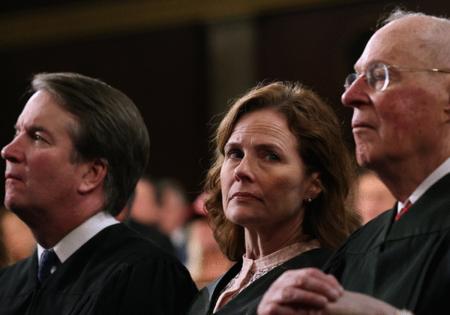Supreme Court sounds ready to back preventive care task force
Published in Health & Fitness
WASHINGTON — The Supreme Court appeared ready during oral arguments Monday to uphold a nationwide preventive care coverage mandate created by the 2010 health care law, in a challenge from a group of Texas businesses objecting to coverage for an HIV preventive drug.
Several key justices questioned the reasoning behind a decision by the U.S. Court of Appeals for the 5th Circuit, which held that the task force that makes decisions about preventive care was unconstitutional because the Senate does not confirm its members.
The challengers and the 5th Circuit decision pointed to provisions in the law that require the U.S. Preventive Services Task Force be “independent” of political influence.
Justice Brett M. Kavanaugh said he didn’t see “indicators” that the law created a task force that required Senate confirmation, pointing out that Congress did not include the language it usually does when it creates Senate-confirmed positions.
“We usually don’t interpret statutes to create independent agencies without some indication that’s stronger than what we have here,” Kavanaugh said.
Justice Amy Coney Barrett questioned whether the law’s mandate that the task force be “independent” could include outside ties that task force members may have — not their independence from political accountability.
Barrett compared it to giving a directive to her law clerks to make an independent judgment free of political or outside influence. “And by that I would mean outside the court. I might mean outside of our chambers, but I might not mean for it to be apart from me, not independent of me,” Barrett said.
The justices also discussed the possibility of sending the case back down to the lower courts to decide whether the law properly gave the secretary of Health and Human Services the power to appoint task force members.
The Trump administration argued that the HHS secretary has the power to remove board members, delay their decisions and veto those decisions entirely.
Hashim M. Mooppan, principal deputy solicitor general, said the “independent” nature of task force members should refer to their own scientific judgment, not whether they’re meant to be part of a Senate-confirmed body.
“They have to be independent in making their recommendations, but that doesn’t mean that they can’t be blocked on the back end,” Mooppan said.
Mooppan defended the task force’s role and pointed out that the Supreme Court has upheld statutes in the past where a body has an unreviewable power not to act, such as decisions by the Public Company Accounting Oversight Board not to bring an enforcement action.
Jonathan F. Mitchell, arguing on behalf of the challengers, said the law does not include any checks on the task force, and the government is relying on broad powers the secretary has to supervise the department.
“I just don’t see how that distinction can be squared with anything in the text of the statute” that requires independence, Mitchell said.
Experts said the case could determine whether insurers nationwide have to cover preventive care, such as cancer screenings, without charging patients. The Supreme Court is expected to decide the case before the conclusion of the court’s term at the end of June.
The case started with a group of challengers with religious objections to the task force’s approval of the HIV preventive drug PrEP. They convinced Judge Reed O’Connor of the U.S. District Court for the Northern District of Texas to invalidate nationwide the preventive care recommended by the task force.
That decision was later narrowed by the 5th Circuit, which upheld the reasoning but narrowed the injunction to the businesses who brought the suit.
The case is Kennedy v. Braidwood Management.
_____
©2025 CQ-Roll Call, Inc., All Rights Reserved. Visit cqrollcall.com. Distributed by Tribune Content Agency, LLC.










Comments